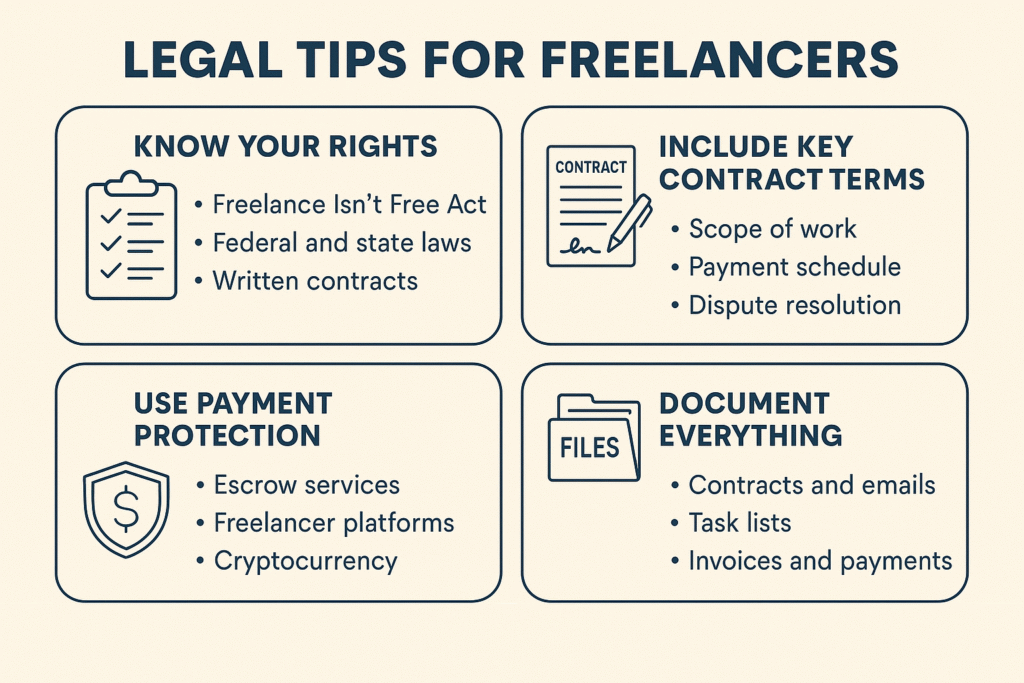How Freelancers Can Legally Protect Themselves from Nonpayment
August 1, 2025
Share Article:
Have Any Question?
Settling disputes with our online arbitration services is easy, fast, and affordable.
We look forward to answering your questions and helping you to reach conflict resolution with our online arbitration service.
Recent Posts

What Is an Arbitration Agreement? A Clear Legal Guide
If you’ve ever signed a cell phone contract, started a new job, or signed paperwork for a gym membership in places like Long Island, Manhattan, or Queens, chances are you agreed to something you barely noticed in the fine print: an arbitration agreement.

Commercial Lease Disputes: Common Causes and Resolution Options
Commercial lease disputes are common in real estate and can create significant financial and legal challenges for both commercial landlords and tenants. Conflicts often stem from disagreements over lease terms, non-payment of rent, or

What Is Breach of Contract? A Clear Guide to Understanding Your Rights and Remedies
Anyone who has ever hired a contractor, purchased a service, or entered into a business agreement knows that contracts create structure. But sometimes things do not go as planned. A vendor misses a deadline, a payment never arrives, or one party simply

What Is an Arbitration Awards: Enforcement and Challenges
Understanding arbitration awards—and the enforcement process—is crucial for any organization relying on arbitration proceedings as its dispute-resolution mechanism. Arbitration offers a faster, confidential alternative dispute resolution

Handling Non-Compete Violations Without Going to Court
A non-compete agreement is a type of restrictive covenant commonly found in an employment contract. Employers often require employees to sign these contracts to prevent job hopping, safeguard trade secrets, and protect client relationships. At their core,
Freelancing offers independence and flexibility, but with that freedom comes risk, especially when clients delay payments or avoid them altogether. In New York and across the United States, independent contractors face unique challenges when it comes to securing timely and full payment for their work. From the NYC Freelance Isn’t Free Act to Small Claims Court remedies, freelancers now have more tools to safeguard their earnings. This guide explores the legal protections, contract strategies, and dispute resolution methods freelancers can use to reduce legal risks and ensure financial stability.
Understanding Your Legal Rights as a Freelancer
Freelancers are legally recognized as independent contractors, which means they are not covered by traditional employment protections. However, several laws provide remedies for late or unpaid invoices:
The “Freelance Isn’t Free” Act (New York City)
Enacted in 2017, this law requires:
- Written contracts for any freelance work valued at $800 or more.
- Timely payment within 30 days unless otherwise agreed.
- The right to seek double damages and legal fees if payment is delayed or withheld.

Federal and State-Level Protections
- The Department of Labor enforces rules on worker classification and contract obligations.
- The New York State Attorney General’s Office investigates cases of widespread wage theft, nonpayment, and contract breaches.
For global freelancers, protections may differ, but unions such as the Freelancers Union advocate for stronger legal frameworks worldwide.
Importance of Written Contracts
A strong written contract is the first line of defense against unpaid invoices, scope creep, and disputes over expectations. Too often, independent contractors rely on emails or verbal agreements, which leave them vulnerable if a client refuses to pay or changes the scope of work without adjusting compensation. Freelancers make agreements official. This helps set clear limits. It also supports their business stability. It makes their position stronger if they need to take legal action.
Key Elements Every Contract Should Include:
- Scope of work: Clearly define deliverables, deadlines, and revisions. Ambiguity leads to contract disputes and higher stress levels when clients expect more than agreed.
- Payment terms: Outline a payment schedule with milestones, late fees, and options like early payment discounts. Referencing standard 30-day payment terms helps maintain healthy cash flow.
- Dispute resolution: Including mediation or arbitration clauses allows for structured Dispute Resolution before resorting to Small Claims Court or costly litigation.
- Intellectual property rights: Clarify who owns the work once payment is received. Without this, freelancers risk losing control of their intellectual property rights during contract breaches.
- Tax obligations: Address tax compliance, including U.S. self-employment taxes and international requirements such as VAT registration when working with global clients.
Additional Contract Protections
Freelancers can strengthen contracts further with:
- Detailed task lists to avoid scope creep.
- Mandatory contracts for work above certain thresholds (as required under the NYC Freelance Isn’t Free law).
- Escrow Services for large projects, ensuring funds are secured before work begins.
- Provisions for statutory damages and legal fees if payment is delayed or withheld in violation of the agreement.
Utilizing Payment Protection Platforms
Technology offers freelancers new ways to safeguard their payments.
Secure Payment Solutions
- Escrow Services: Platforms like Escrow.com hold funds until the freelancer delivers the agreed work.
- Freelancer Platforms: Many include built-in dispute resolution, but check the terms and conditions carefully.
- Cryptocurrency Payments: Some independent contractors accept Bitcoin or Ethereum for faster global payments, though this comes with added tax compliance considerations.
Incentives for Early Payments
Freelancers can offer small discounts for early payment, which improves cash flow and reduces stress levels.
Documenting Work and Communication
If disputes arise, proper documentation can make or break a legal case.
Best Practices for Recordkeeping
- Maintain detailed task lists for every project.
- Store contracts in GDPR-compliant document storage systems for data protection.
- Save all client communications, emails, chats, and signed agreements.
- Keep a record of invoices and payment schedules to prove delays or breaches.
In the event of legal action, thorough documentation supports claims in Small Claims Court or civil proceedings.
Addressing Payment Disputes
Despite safeguards, disputes happen. Here’s how freelancers can manage them:
Step 1: Professional Follow-Ups
Send polite reminders and attach unpaid invoices. Use language that references agreed payment milestones.
Step 2: Mediation Services
Independent mediators, or groups like the Editorial Freelancers Association, provide structured resolution before escalating to court.
Step 3: Legal Escalation
- Small Claims Court: In New York, freelancers can recover up to $10,000 without hiring a lawyer.
- Civil Action: For larger unpaid contracts, freelancers may pursue civil lawsuits.
- Collection Agencies: As a last resort, agencies can pursue unpaid invoices, though they typically take a percentage of recovered funds.
If a client violates the Freelance Isn’t Free Act, they may also face statutory damages and fines from the New York State Attorney General’s Office.
Staying Compliant with Regulations
While pursuing payment, freelancers must also remain compliant with legal obligations.
Tax Obligations
- Report all income, including cryptocurrency payments, to the IRS.
- According to the IRS, Independent contractors in the U.S. must pay self-employment tax and ensure proper tax compliance.
Insurance and Liability
- Consider professional indemnity insurance for protection against intellectual property disputes and liability issues.
- For freelancers handling sensitive data, cyber liability insurance helps cover breaches.
Worker Classification Issues
Freelancers should be vigilant about being misclassified by clients as employees, as this affects National Insurance Contributions and tax obligations.
The Future of Freelancer Protections
With the rise of the gig economy, more states are adopting protections modeled after New York’s Freelance Isn’t Free law. In fact, advocates are pushing for a federal Freelancer Payment Protection Act to extend rights across the United States.
Freelancers are also building power through organizations like the Freelancers Union, campaigns like #FreelanceIsntFree, and global collaborations that advocate for better protections.
As laws evolve, freelancers should stay informed through legal resources, unions, and professional associations to ensure compliance and safeguard their financial security.
Final Thoughts
Freelancers are business owners, and protecting yourself from nonpayment is critical to long-term success. By drafting solid written contracts, leveraging secure payment systems, and understanding your rights under laws like the NYC Freelance Isn’t Free Act, you can reduce risks and focus on your craft.
If you live in New York City, Nassau County, or Suffolk County and need help with legal practices, contract drafting, or dispute resolution, Rapid Ruling offers professional advice. They help freelancers protect their earnings and keep their businesses stable..
Contact Rapid Ruling today to learn how you can safeguard your freelance business and secure timely and full payment for your work.
Recent Posts

What Is an Arbitration Agreement? A Clear Legal Guide
If you’ve ever signed a cell phone contract, started a new job, or signed paperwork for a gym membership in places like Long Island, Manhattan, or Queens, chances are you agreed to something you barely noticed in the fine print: an arbitration agreement.

Commercial Lease Disputes: Common Causes and Resolution Options
Commercial lease disputes are common in real estate and can create significant financial and legal challenges for both commercial landlords and tenants. Conflicts often stem from disagreements over lease terms, non-payment of rent, or

What Is Breach of Contract? A Clear Guide to Understanding Your Rights and Remedies
Anyone who has ever hired a contractor, purchased a service, or entered into a business agreement knows that contracts create structure. But sometimes things do not go as planned. A vendor misses a deadline, a payment never arrives, or one party simply

What Is an Arbitration Awards: Enforcement and Challenges
Understanding arbitration awards—and the enforcement process—is crucial for any organization relying on arbitration proceedings as its dispute-resolution mechanism. Arbitration offers a faster, confidential alternative dispute resolution

Handling Non-Compete Violations Without Going to Court
A non-compete agreement is a type of restrictive covenant commonly found in an employment contract. Employers often require employees to sign these contracts to prevent job hopping, safeguard trade secrets, and protect client relationships. At their core,

